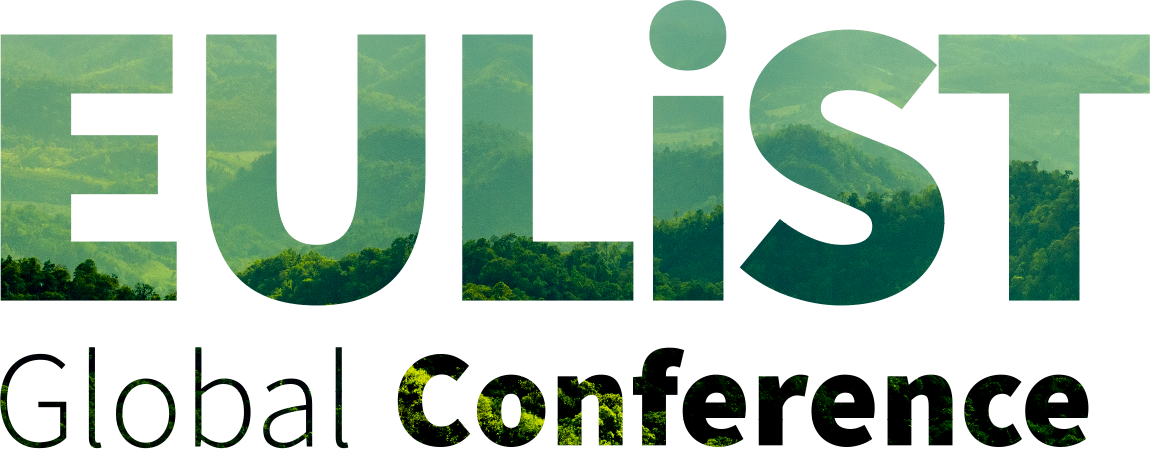 Pre-conference for PhD students (and Postdocs within 2 year after obtaining PhD)
Pre-conference for PhD students (and Postdocs within 2 year after obtaining PhD)
 Welcome to the pre-conference
Welcome to the pre-conference
Organisers: Kerstin Johansen (JU), M. Benedetta Mattei (UNIVAQ)
• Background
• Structure of the afternoon
• Expectations
 “Research for Impact: Empowering Early-Career Researchers to Shape Climate-Resilient Futures”.
“Research for Impact: Empowering Early-Career Researchers to Shape Climate-Resilient Futures”.
• Kateryna Kryzhanivska (LUT)
 Question and discussions with the keynote speaker
Question and discussions with the keynote speaker
 Parallel session introduction
Parallel session introduction
 Each track starts their presentations which are coordinated by one chair (moderator)
Each track starts their presentations which are coordinated by one chair (moderator)
 Track 1. Renewable energy systems: hydrogen, renewable energy sources, storage solutions, societal impacts
Track 1. Renewable energy systems: hydrogen, renewable energy sources, storage solutions, societal impacts
• Moderator: Andrea Di Carlo (UNIVAQ)
• Armando Vitale (UNIVAQ)
• Alejandro Pérez Domínguez (URJC)
• Barbara Malsegna (UNIVAQ)
• Sanni Sipinen (LUT)
• Pantelis Manakas (NTUA)
• Ting Pan (BUT)
 Track 2. Innovations in advanced materials and smart manufacturing for Sustainable Industry 4.0
Track 2. Innovations in advanced materials and smart manufacturing for Sustainable Industry 4.0
• Moderator: To be confirmed (JU)
• Simon Fetzel (STUBA)
• Lotfi Makhlouf (IMT)
• Meysam Norouzi Inallu (LUT)
• Michal Križo (STUBA)
• Ilias Theodoropoulos (NTUA)
 Track 3. Climate change, environmental resilience, and green urban transitions: technologies and strategies for a sustainable future
Track 3. Climate change, environmental resilience, and green urban transitions: technologies and strategies for a sustainable future
• Moderator: To be confirmed (UNIVAQ)
• Angeliki I. Chronopoulou (NTUA)
• Raghad Awad (STUBA)
• Vanessa Tomei (UNIVAQ)
• Fernanda Gomez Saenz (LUH)
• Ivy Londa (LUT)
• Lenka Pálešová (BUT)
 Track 4. Bioengineering, biotechnology, and smart systems for health, mobility, and sustainable communities
Track 4. Bioengineering, biotechnology, and smart systems for health, mobility, and sustainable communities
• Moderator: Ioanna Giouroudi (TUW)
• Tayyab Rehman (UNIVAQ)
• Rabia Altunay Kan (LUT)
• Neziha Akalin (JU)
• Konstantinos Gounaridis (NTUA)
• Víctor Díaz Mena (URJC)
 Short break
Short break
 Discussions in each track related to the presentations – moderated by a chair
Discussions in each track related to the presentations – moderated by a chair
• Purpose is to summaries 2-4 joint ideas for future collaborations (joint paper writing, mobility activities, research proposal writing, joint educational activities etc)
• Depending on the number of participants – this could be organized by breakout rooms related to each presenter (who in that case will be the moderator)
 All are welcome to a final summary
All are welcome to a final summary
• Short summary of each track – chair (moderator) and participants
• Virtual assessment via a virtual tool / questionnaire (ideas of questions are on the conceptual level)
 Thank you for a nice session – and goodbye
Thank you for a nice session – and goodbye
 End of session
End of session
 Acreditation of participants (entrance hall)
Acreditation of participants (entrance hall)
 Official opening(Plennary Main Hall, Basement)
Official opening(Plennary Main Hall, Basement)
• Abraham Duarte. Rector Universidad Rey Juan Carlos.
• María Luisa García Mínguez. Deputy Head of Unit, European Commission Education, Audiovisual and Culture Executive Agency (EACEA).
• Miguel Gómez Herrero, Aranjuez City Mayor.
• Pablo T. Salvadores. Chair of EULiST Global Conference Organizing Committee.
 Family Photo
Family Photo
 Plenary session: Cities and EULiST joining for sustainability(Plennary Main Hall, Basement)
Plenary session: Cities and EULiST joining for sustainability(Plennary Main Hall, Basement)
• Moderator: Antonia Lampropoulou. National Technical University of Athens. International Relations Department.
• Bernadette Luger. City of Vienna. Head of Coordination Unit for Resource Conservation and Sustainability in the Construction Sector.
• Johannes Lutter. UIV Urban Innovation Vienna. Head of Strategic Partnerships and International Relations.
• Ding Ma. City of Lappeenranta. Head of Economic Development.
• Eleni Alexandrou. National Technical University of Athens. On behalf of City of Athens Deputy Mayor Nikos Chrysogelos.
• Oleksandra Naryzhna. Urban Reform. Ukraine.
 Coffee break
Coffee break
 1. Parallel session: Knowledge Through research(Room H213, Second Floor)
1. Parallel session: Knowledge Through research(Room H213, Second Floor)
Topic 1: RESEARCH- Sustainable solutions to climate change
 2. Parallel session: Industrial partners as vectors of transformation(Room H114, First Floor)
2. Parallel session: Industrial partners as vectors of transformation(Room H114, First Floor)
Topic 1: Financial cooperation between companies and universities: from the national to the European level
 3. Parallel session: Urban Resilience and Climate Neutrality(Plennary Main Hall, Basement)
3. Parallel session: Urban Resilience and Climate Neutrality(Plennary Main Hall, Basement)
Topic 1: Adaptive buildings and infrastructures
 4. Parallel session: Information and society(Room H126 - First Floor)
4. Parallel session: Information and society(Room H126 - First Floor)
Topic 1: Building knowledge in collaborations between academia and industry for sustainable development
 Lunch break
Lunch break
 1. Parallel session: Knowledge Through research(Room H213, Second Floor)
1. Parallel session: Knowledge Through research(Room H213, Second Floor)
Topic 2: EDUCATION- Novel Educational Approaches for sustainable solutions
 2. Parallel session: Industrial partners as vectors of transformation(Room H114, First Floor)
2. Parallel session: Industrial partners as vectors of transformation(Room H114, First Floor)
Topic 2: Structuring Partnerships through Academic projects inside EULiST Alliance
 3. Parallel session: Urban Resilience and Climate Neutrality(Plennary Main Hall, Basement)
3. Parallel session: Urban Resilience and Climate Neutrality(Plennary Main Hall, Basement)
Topic 2: Urban transformation and circularity
Topic 3: Digitalisation and AI for urban change
 4. Parallel session: Information and society(Room H126 - First Floor)
4. Parallel session: Information and society(Room H126 - First Floor)
Topic 2: Building knowledge for sustainable practices in collaborations between universities, funding agencies and NGOs within and beyond EU
 Social activity
Social activity
Guided walking tour through the historic centre of Aranjuez.
Meeting Point: Universidad Rey Juan Carlos, Edificio Antiguo Cuartel de Pavía (inner courtyard). San Pascual Street.
 Dinner (dress code: business casual)
Dinner (dress code: business casual)
Location: Hotel NH Aranjuez, San Antonio Street, 22
 1. Parallel session: Knowledge Through research(Room H213, Second Floor)
1. Parallel session: Knowledge Through research(Room H213, Second Floor)
Topic 3: Connecting education and research in climate resilience and sustainable solutions
 2. Parallel session: Industrial partners as vectors of transformation(Room H114, First Floor)
2. Parallel session: Industrial partners as vectors of transformation(Room H114, First Floor)
Topic 3: What are companies' expectations when partnering with a European university?
 3. Parallel session: Urban Resilience and Climate Neutrality(Plennary Main Hall, Basement)
3. Parallel session: Urban Resilience and Climate Neutrality(Plennary Main Hall, Basement)
Topic 4: The societal dimension of urban transformation: Ensuring sustainable and inclusive communities
 4. Parallel session: Information and society(Room H126 - First Floor)
4. Parallel session: Information and society(Room H126 - First Floor)
Topic 3: Science Communication Workshop - Communicating with companies, funding agencies and NGO’s
 Coffee break
Coffee break
 Final plenary session(Plennary Main Hall, Basement)
Final plenary session(Plennary Main Hall, Basement)
• WRAP-UP of all Parallel sessions and Pre-conference
 Closing session(Plennary Main Hall, Basement)
Closing session(Plennary Main Hall, Basement)
• César Cáceres: URJC Rector's Delegate for EULiST
• Natia Gamkrelidze: EULiST's Secretary General
• Pablo T. Salvadores and Antonia Lampopoulou. EULiST Global Conference Organizing Committee

